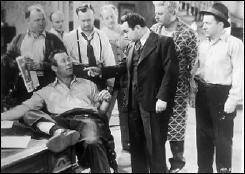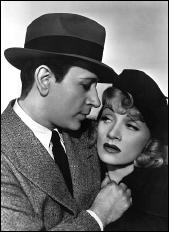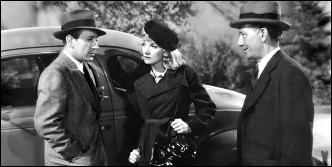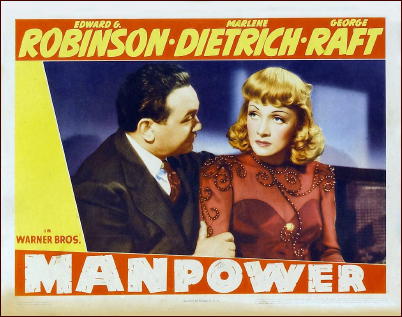Fri 20 Jan 2012
A Movie Review by Dan Stumpf: MANPOWER (1941).
Posted by Steve under Action Adventure movies , Reviews[4] Comments

MANPOWER. Warner Brothers, 1941. Edward G. Robinson, Marlene Dietrich, George Raft, Alan Hale, Frank McHugh, Eve Arden, Barton MacLane, Ward Bond, Walter Catlett, Joyce Compton. Director: Raoul Walsh.
I’ve often said that Raoul Walsh and Michael Curtiz were the two most artistic directors ever to come out of Hollywood, and the next time someone doubts it, I’ll show them this film.
Back in the early 30s, Howard Hawks made a film called Tiger Shark, with Edward G. Robinson, Richard Arlen and Zita Johann, about two fishermen-buddies drawn to the same woman, and what happens when she marries the wrong one.

It made a lot of money for Warner Brothers, so the Studio Heads, with the wisdom of their breed, used to dust off the script, every other year or so, change the profession to Well Drilling, Stunt Flying or what-have-you, and make it again with a different cast and director. No wonder the Warners’ Script Department was known as Echo Valley!

By 1941, Edward G. Robinson had again rotated into the Chump role, with George Raft and Marlene Dietrich as his friends and lovers. The profession this time was Power Line Repairmen, and the director was Raoul Walsh.
The result is Hollywood Filmmaking at its Absolute Apex. The whole idea of making a film about a vast, outdoorsy job like Power Line Work entirely on Studio Sets seems audacious when you think about it, but it probably never occurred to Walsh or Warners to do it any other way.
The studio “exteriors” are beautifully constructed, and Walsh moves his craning camera through them with an easy grace that recalls the best of Fred Astaire.
He gets real excitement from shots of men clinging to icy towers, in no way diminished by their obvious fakiness, and he manages to break down George Raft’s usual reticence almost completely; there’s a strong sense of Feeling in the scenes between Raft and Robinson, and startling, genuine sexual tension between Raft and Dietrich.

Best of all, despite the fact that this plot had been done to death by the time he got to it, Walsh makes it seem almost spontaneous. As the characters move on their predestined routes towards Betrayal and Murder, there’s never the sense of Fatalism that could so easily suffuse a worn-out storyline like this.
Of course, Walsh does all this and a lot more with a quiet professionalism that entirely eludes most critics, but a careful look at his camerawork, pacing, and feel for the material show a director who deserves to be taken a lot more seriously than many of his better-known contemporaries. Maybe someday he will be.

January 20th, 2012 at 11:00 pm
I’ve not seen this movie. Whenever I’ve had the chance, I’ve always turned it down. A movie about power line repairmen? Are you kidding?
My mistake, and one I won’t make again.
It’s available on DVD from Warner Archives, and I’m sure it turns up on TCM every so often.
As for director Raoul Walsh, I think he might be better known today than he was in 1991, when Dan wrote this review, now that those of us who love to watch old movies can actually see them whenever we want.
Books such as Raoul Walsh: The True Adventures of Hollywood’s Legendary Director, by Marilyn Ann Moss (University Press of Kentucky; May 2011) don’t hurt either.
January 21st, 2012 at 8:52 am
I’ve seen it and it’s everything Dan said it is. I’ve never been a fan of George Raft but I am a fan of Edward G. Robinson.
January 21st, 2012 at 10:44 am
Whenever I see the critics drooling over the latest movie by Spielberg or Scorcese — bloated and arid — I think about guys like Walsh, Curtiz, and Aldrich, who could do wonders with almost anything handed to them.
I almost never see any kind word about George Raft, but I always thought his turn in SCARFACE — the frost to Muni’s fire — was well done. And in THE GLASS KEY, his dispassionate presence was a pretty good visual and dramatic representation of Hammett’s prose style.
January 21st, 2012 at 2:07 pm
I met George Raft briefly in 1962. He was a great guy. Liked him a lot.